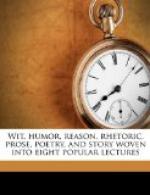Now and then I am asked: “What will become of the men who are engaged in the liquor business if the country goes dry? What will become of their families?” I answer by asking: What becomes of the men the saloons put out of business? What becomes of their families? When prohibition puts a man out of business, it leaves him his brain, blood, bone, muscle, nerves and whatever manhood he has left in store, while his long rest from active toil has given him a reserve force for active, useful business. When the saloon puts a man out of business, he goes out with shattered nerves, weak will, poisoned blood and so unfitted for service no place is open for him to earn a living. Recently a man put out of business by prohibition said to me: “This town went dry seven years ago, and going out of the saloon business has been such a benefit to me and to my family, I shall work and vote to put all other saloon-keepers in this state out of business for their own good.”
On the other hand, I have in mind a man who once chained the Congress of the United States by his eloquence. Clients clamored for his service, and prosperity crowned his practice in the courts. In drinking saloons he lost his clientage and in penniless poverty he died—unwept, unhonored, unsung. The ex-saloon-keeper to whom I referred is city marshall and very popular, while the man put out of business by the saloon has no chance:
“Where he goes and how he fares,
Nobody knows and nobody cares.”
Along with the question of what will become of the men put out of business by prohibition, comes the question, what will the farmers do with their corn if distilleries are closed? Less consumption of whiskey means more consumption of cornbread and that means more corn. Less consumption of whiskey means greater consumption of bacon, and more bacon means more corn to feed hogs. When a liquor advocate said to an audience of farmers: “If this state goes dry what will you farmers do with your corn,” an old, level-headed farmer shouted: “We’ll raise more hogs and less hell.”
Prohibition means more of everything good, and less of everything bad; more manhood, less meanness; more gain, less groans; more bread, less brawls; more clothing, less cussedness; less heartaches and more happiness. Turn saloons into bake shops and butcher stalls, distilleries into food factories, breweries into stock pens, and the country will be a thousandfold better off than feeding its finances by starving its morality.
This question lifts itself head and shoulders above every other question touching practical politics today. You nowhere read of a nation going to destruction because of too much gold or too little silver, too much tariff or too little tariff, but always because of the vices of its people. The nation that bases perpetuity upon moral character will endure with the stars, while walls thick and high as Babylon’s will not save a drunken republic.




